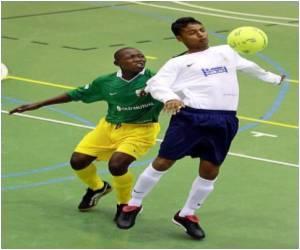
In a village with neat brick homes but no electricity, few have ever seen a television, much less a major sporting event. Here, like across much of Africa, the only contact with the outside world is through radios, when there are batteries.
"It's good that this TV has been brought here so many of the rural communities can watch the World Cup," said 17-year-old Gambudzia Mutale, watching the screen light up as the sun slid to the horizon.
"Many people have not had an opportunity to watch such a thing," the teenager said in neat English.
Just one Ghanian flag waved in a village, and one person who found a vuvuzela was blowing the trumpet that has come to symbolise South Africa's World Cup.
Such items are luxuries in remote regions like Zambia's Mongu district, but the crowd is united behind Ghana, the only African team to clear the group stages.
Advertisement
Most people here survive by growing cassava and fishing in the mighty Zambezi River, which begins in nearby Angola and flows across the continent to the Indian Ocean.
Advertisement
The children will be asked to report on their experiences, stories that will be shared online with the rest of the world.
"If we want to reach youth particularly in remote areas you go to the most remote areas and when you come to Mongu don't do it in Mongu town but the remotest part, this is where they don't have access to television," said George Githuma, of the Children's Radio Foundation.
Children's Radio Foundation has so far trained 17 young Journalists in the province and they are mainly reporting on community issues such as importance of education, culture and HIV/AIDS among others.
But for now, the crowd enjoys the soft glow of the screen on a cool evening, waiting for Ghana to take the field.
"This is incredible," said 12-year-old Alex Masinda as the commercials reel on before the game. "It's a good form of entertainment."
Source-AFP









